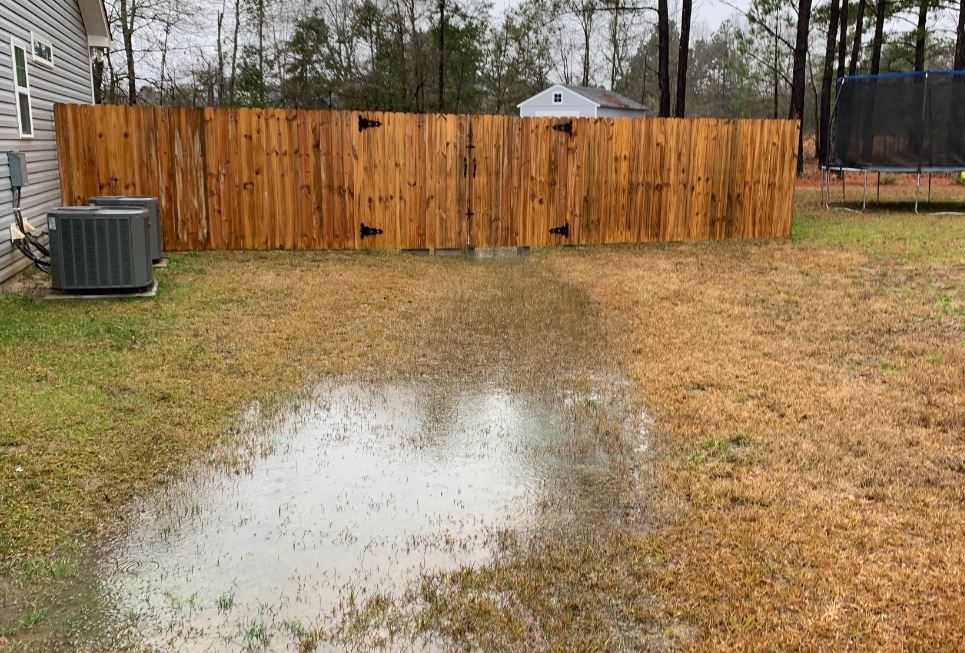For service in the Atlanta, Georgia area contact or call us:
Wet Yard Solutions
Wet yards and lawns are common in the Atlanta area. Georgia geology is often just-plain “Georgia Red Clay.” Combine the clay with the undulating hills, and you get water problems in yards. Clay-laden soils retain water and often create saturated soils. The Atlanta hilly topography naturally creates drainage draws which direct water to streams and rivers. Houses built on the hillside of these draws doom many lawns to suffer sogginess.
Wet yards are always a problem. I receive many calls inquiring about wet, soggy yards. Many of the callers believe they have an underground spring in their yard. We will examine how underground water saturates your yard and how to solve this problem.

How Water Tables Affect your Property
We also know water tables as groundwater tables. The water table separates the groundwater that lies below it from the unsaturated soils above it.
Water tables tend to parallel the ground surface, although flatter than the rising and falling ground contours. Although water tables run approximately parallel to the ground surface, their slope is not as steep as the ground surface.
Rainwater absorbs into the soil. The water flows downward by the pull of gravity until it reaches the water table. Then the flow of the water in the ground moves in a downward and horizontal direction. Where the water table intersects the ground surface, the water flows from the ground. Often, this gives the appearance of springs.
Water tables that seep into yards are more prevalent during rainy seasons. During dryer periods, water tables will fall in elevation. Wet yards are more commonplace after long periods of rainfall. There is a lag between the time of maximum rainfall and the highest water table levels. It takes time for rains to affect the depth of the water table.
Solving Wet Yard Problems
Seasonal wet yards are a nuisance, but go away during dryer periods. Wet yards affect the usability of a yard even during periods of short rainy periods. The kids cannot enjoy the yard, pets track mud into the house, and the grass dies. What do you do?
One solution is to install a French drain to intercept the water. Install the French drain at the higher elevation of the property. The French drain gravel collects the underground water in a pipe, and the water piped to an appropriate discharge point.
Whether water is above ground or below the surface, it always seeks the path of least resistance. Contractors fill French drains with gravel or stone and have perforated pipes in the trench’s bottom. The gravel creates a channel for the water and directs it to the pipe in the French drain. It transports the water to a discharge point. The French drain removed the soil’s moisture, and the yard returns to being dry and usable.
Who needs a French drain?
The depth of the French drain will vary depending on the contour of the property. It often requires deeper French drains for land with more significant elevation changes. Multi-drain lines are necessary for larger yards. Your hydrology specialist will help you determine the French drains’ location and depth required to solve your wet yard problem.
Do I have a Spring in my yard?
Springs occur when water pressure causes a natural flow of groundwater onto the earth’s surface. As rainwater enters or “recharges” the underground water table, the additional water places more significant pressure on the water already present.
This pressure moves water through the voids within the saturated ground, and the water flows naturally to the surface at places called springs.
Usually, a spring will create a continuous flow of water from the ground. The wet yards we see in Georgia are primarily due to soil saturation from the high-water table and are not springs.
Although springs do occur in the Atlanta area, they are not prevalent.
Seek a Hydrology Specialist
The Source of unwanted water in your yard is often challenging to comprehend and to understand. Seek out a local Hydrologist to help you understand the issues and provide a solution to your wet yard problems.
The USGS has done extensive research on drainage runoff and the drainage basins.
Additional Stormwater Drainage Articles
Find a Drainage Specialist for drainage consultation
Yard Drainage Problems Devalues Property
Simple Solutions to Residential Drainage Problems
Learn the Benefits of Stormwater Drainage Swales
Solving Wet, Soggy Yard Problems
Common Drainage Problems of Homeowners
Preventing Crawl Space Drainage Issues
Do you have Groundwater Springs on your Property?
Stormwater Damage from the Property Upstream
Stormwater Utilities and Detention Ponds
Forensic Hydrologist Evaluates Stormwater Runoff
Hydrology Expert Contact Information
Additional Services by Atlanta Engineering Services
G-ZNJ8QW23K9